(Bruno Donat, current Chief of the UNMAS Geneva office, with UN Secretary-General António Guterres in Goma during an earlier assignment with MONUSCO. Copyright: UN Photo/Jacques Miroza)
A time to remember the importance of eliminating the threat posed to vulnerable populations by mines, explosive remnants of war, improvised explosive devices, and more…
Mine Action plays a unique bridging role across the humanitarian-development-peace nexus
The International Day for Mine Awareness and Assistance in Mine Action, commemorated on 4 April each year, is an opportunity for the United Nations Mine Action Service (UNMAS) and other organizations to reflect and raise awareness on, inter alia, landmines, explosive remnants of war (ERW), improvised explosive devices (IEDs) and act further toward their eradication. Just last year on that day, Secretary-General António Guterres stated that “all people have the right to live in security, and not fear their next step. Mine action clears paths and creates safe ground on which homes can be built or rebuilt.
Mine action changes mindsets so that people know how to protect themselves. It gives people and communities new horizons and hope.”
The Chief of the UNMAS Geneva office, Mr Bruno Donat, when addressing youngsters tells them “it has to do with everything that goes boom.” Mr. Donat explains to them that Mine Action plays a unique bridging role across the humanitarian-development-peace nexus and in real terms often allows children to return to school and their playgrounds, farmers to work again on their land, and goods to reach markets.
UNMAS, an integral component of UN peace operations
UNMAS works towards the vision of the United Nations of “a world free from the threat of mines, ERW, including cluster munitions, and IEDs, where individuals and communities live in a safe environment conducive to sustainable peace and development, where no one is left behind, where the human rights and the needs of victims are met and where they are fully integrated as equal members of their societies.” It is mandated to coordinate mine action within the United Nations system as Chair of the Inter-Agency Coordination Group on Mine Action.
On one hand, as a specialized service of the United Nations located within the Office of Rule of Law and Security Institutions (OROLSI) of the Department of Peace Operations (DPO), UNMAS is an integral component of UN peace operations. It also responds to specific requests for support from the UN Secretary-General or the designated official in an affected country. On the other hand, and particularly through its Geneva office which serves as a humanitarian mine action hub, UNMAS is also the global lead for the Mine Action Area of Responsibility (MA AoR), currently with Humanity & Inclusion (HI) as co-lead, within the Global Protection Cluster.
(Mary Arok delivering a training session on explosive ordnance risk education in Birisi village, in the southern part of South Sudan. Copyright: UNMISS)
UNMAS provides Member States, the United Nations system and its leadership, as well as the mine action sector at large, with authoritative, impartial expertise and experience acquired through its humanitarian, development, peace operations and peacebuilding assistance to affected countries, as well as through its participation in, and contributions to, mostly Geneva-based treaty-related processes. The Geneva office hence serves as the focal point within UNMAS for mine action relevant treaties, including the Anti-Personnel Mine Ban Convention (APMBC), the Convention on Cluster Munitions (CCM), and the Convention on Certain Conventional Weapons (CCW), and facilitates the preparation of “one UN” statements in these fora.
(World-renowned actor Daniel Craig is the first UN Global Advocate for the Elimination of Mines and Explosive Hazards. UN Photo/Mark Garten)
Daniel Craig, UN Global Advocate for the Elimination of Mines and Explosive Hazards
4th of April is another opportunity for world-renowned James Bond actor Daniel Craig, also the United Nations Global Advocate for the Elimination of Mines and Explosive Hazards, to reach out to several audiences across the world. On the occasion, UNMAS released a Joint Statement from Mr. Craig and UNMAS Director Agnès Marcaillou, contributing to raising awareness.
This 4th of April, UNMAS also highlighted work on clearance, risk education, victim assistance, advocacy and stockpile destruction as relevant about some 19 countries, territories and Missions to which it provides direct support and assistance.
Given the 23rd International Meeting of National Mine Action Directors and United Nations Advisors (NDM) at the Palais des Nations in February saw a record number of some 800 registrants, it was going to be any way a tough act to follow in terms of face-to-face outreach. However, given the circumstances with COVID-19, UNMAS shifted its April advocacy campaign primarily online.
UNMAS has already started adapting its mine risk education messaging to incorporate guidelines of the World Health Organization (WHO) on COVID-19.
The UNMAS Geneva Chief, Bruno Donat, sees the 4th of April as an inspiring day and a perfect time to also promote the much-needed strengthened partnerships in the mine action sector and beyond, to alleviate the suffering of so many affected. He highlights particularly the importance of incorporating gender considerations while providing assistance to survivors, family members and communities directly and indirectly impacted by explosive ordnance.
By Julia Rosso, Public information officer at the United Nations Mine Action Service (UNMAS), Geneva office.
Read the original article here on UN Today.




